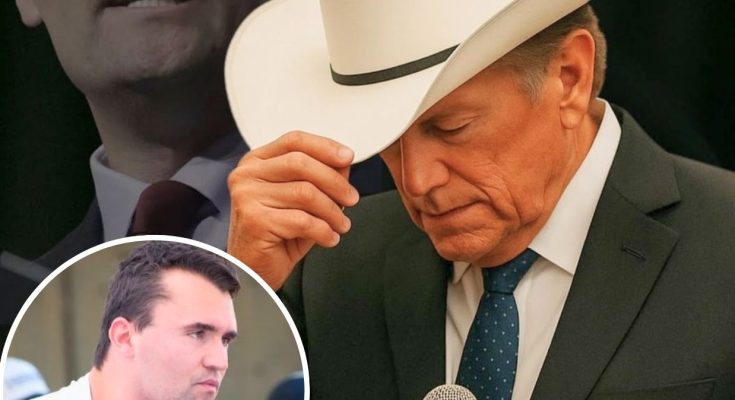At seventy-three, George Strait could have chosen rest. After six decades of music, sixty number-one hits, and a life measured in sold-out arenas, few would have questioned if the King of Country stepped quietly into the shadows. He had already given America more than any artist could ever be asked to give — a soundtrack for generations, a voice woven into the fabric of family reunions, long highways, and quiet nights on the porch.
But when Charlie Kirk’s life was cut short at just 31, George Strait made a different choice.
He returned to the stage, not for fame, not for accolades, but for remembrance. This was no ordinary concert. This was an offering — a gift from a legend to a grieving nation.
A Ballad Carved From Grief
With guitar in hand, Strait stood beneath the lights, the brim of his hat shadowing eyes heavy with memory. The first chords rang out, slow and deliberate, each note carrying a weight beyond sound. He sang not for the charts, not for radio, but for eternity.
Every lyric was a prayer.
Every refrain was a testimony.
Every silence between the notes carried the ache of loss.
For the thousands gathered, and for the millions watching, his ballad gave voice to what words alone could never say. Love. Loss. Faith. Sorrow. Hope. All braided together in the trembling strength of a song.
Not Performance, But Offering
Strait’s tribute to Charlie Kirk was more than a musical moment. It was a sacred act. As the hush fell over the crowd, his song became Charlie’s echo — carrying his memory into the stillness, reminding the world that while a young man’s voice had been silenced, his message and mission endured.
People didn’t just hear George Strait that night. They felt him. They felt the burden of a father singing for every parent who has lost a child. They felt the weight of an elder statesman of music turning tragedy into legacy. They felt a nation’s grief transformed into something holy.
Music as Witness
At seventy-three, George Strait reminded us all that music is more than melody and memory. It is witness. It testifies when words fail. It carries the truth of human experience — our joy, our sorrow, our longing for redemption — across time and into eternity.
That night, Strait was not merely a performer. He was a witness.
A witness to a life ended too soon.
A witness to a family left in grief.
A witness to a nation still searching for faith amid loss.
And in that witness, something remarkable happened. The tragedy was transformed into legacy.
The Legacy Lives
For Erika Kirk and her children, for Charlie’s parents, for his friends and supporters, Strait’s ballad became a promise: that Charlie’s life would not be forgotten, that his truth would still echo, that his voice would carry on through the strength of others.
And for America, the moment reminded us that grief can unite, that faith can endure, and that music can heal.
George Strait did not step onstage to entertain. He stepped onstage to remember.
And in doing so, he turned one man’s absence into a nation’s testimony.



